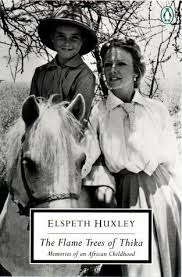
THE FLAME TREES OF THIKA is famous as a memoir of an African childhood. It deserves its fame, I would say, being a simple and heartfelt account of a unique time and place.
The story begins with a five year old girl arriving in Kenya with her parents in 1912. Her father buys some land, on impulse, while drinking one night, and the family bizarrely decides to move out there – to land they’ve never seen – to start farming coffee. Don’t be misled by this into thinking that they are doing this because they have experience in coffee farming; or indeed experience in any farming; these are aristocratic people of very small means but apparently very large balls. One is reminded how insanely brave/stupid early settlers were.
The local Kikuyu certainly lean towards finding them on the stupid end of the spectrum. They can’t understand why the white man thinks they will want to work for him, as they have no use for formal money. They are fascinated however by the paraffin lamps, and eventually agree to work in exchange for a lamp each, after they have been convinced that they are not the spirits of dead men, caged up in glass. The farm slowly takes shape, and we are introduced, through the eyes of the little girl, to the small community, both European and Kikuyu.
Here is one of the first meetings between the Europeans and Kikuyu community, with one English gent very embarrassed by the exposed genitals of the Kikuyu men.
“Perhaps we should not have brought the ladies on this expedition,” he murmured to Alec; but Tilly overheard.
“Perhaps we should not have brought the gentlemen,” she suggested, indicating a number of well-greased, shaven-headed girls who had nothing on but very small triangles of leather and strings of beads . . .
Much of the joy in the book is the evocation of a lost world. Here for example is the child’s account of the response of an old Kikuyu man as he agrees to look after her pony when she eventually has to leave Thika: “Good. When we see this white pony, we shall say: here is the toto of bawana bad hat, she will have this pony in her head as a man herds his cattle there, so we will think of you when we see him.”
Huxley does a remarkable job of creating a believable child’s voice, which is I think quite an achievement, most children in literature being either fakey or annoying. The writing is often very lyrical:
One morning I surprised two dikdik in the glade, standing among grass that countless quivering cobwebs had silvered all over, each one – and each strand of every cobweb – beaded with dew. It was amazing to think of all the untold millions of cobwebs in all the forest glades, and all across the bush and plains of Africa, and of the number of spiders, more numerous even than the stars, patiently weaving their tents of filament to satisfy their appetites, and of all the even greater millions of flies and bees and butterflies that must go to nourish them; and for what end, no one can say.
